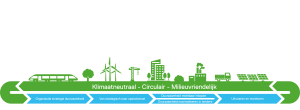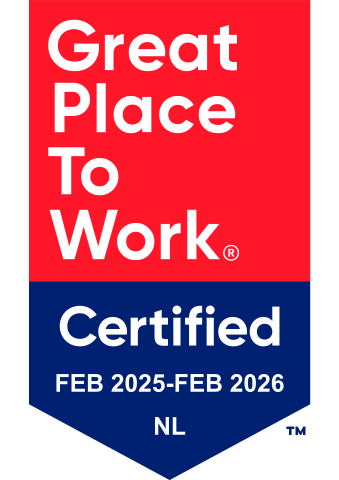We are accelerating the transition to a sustainable construction economy by guiding companies and inspiring them to exceed their sustainability ambitions.
To achieve the climate goals, change is essential for everyone. Sustainability is no longer an option but an absolute must. Flux Partners guides organisations and government agencies as they embrace this change. We believe in a pragmatic approach, in which we make sustainability measurable and translate complex concepts into feasible objectives and actions.
Our services
Our team of dedicated sustainability specialists are on hand to assist you every step of the way. We provide our sustainability expertise to various sectors – including infrastructure, (utility) construction and energy (wind, heat, sun and P2X). This includes the development of sustainable procurement strategies for wind parks, the production of ECI calculations and working with contractors to achieve zero-emission construction sites. These are just some of the many services we offer. See the detailed overview of our services below.

Sustainability strategy and legal advice
Climate change has brought about a growth in moral awareness, social need and the strategic importance of sustainability. The challenge is to decide on specific sustainability measures and integrate them into ambitions, strategy, policy and implementation. Flux Partners helps companies, government agencies and civil organisations do this. Our advisors assess (international) legislation, translate it into specific implications for your organisation and use pragmatic overviews and tools to assist you with implementation.
Area development
Sustainable area development is key to efforts to make society more liveable and resilient. With pressure on the environment increasing, the integration of sustainability principles into area development is a priority. This must span every phase of the policy cycle, from development to concretisation, implementation and feedback. Flux Partners advises government agencies on policy integration and the exploration of new opportunities to make a district, area, municipality or province as optimal, integral and sustainable as possible.
Sustainable tendering and implementation
Central government, provinces, water boards and municipalities are placing more and more emphasis on sustainability in their procurement policies. The importance of sustainability in tenders is reflected in grounds for exclusion, suitability requirements, most economically advantageous tender (MEAT) selection criteria and contract requirements. Our advisors guide you in the analysis of an invitation to tender and the development of a strategy to ensure you optimally meet all the criteria applicable. We can also assist you in the extraction of relevant information from your organisation and provide substantive knowledge and expertise in the field of sustainability. Finally, we help you prepare the final versions of EMVI plans or other (quantitative) criteria, e.g. ECI, LCA, CO2, nitrogen, etc. All this makes it possible to arrive at the best price-quality ratio.
Life cycle analysis
A life cycle analysis (LCA) analyses the environmental impact of a product throughout its life cycle. In the Netherlands, this information is used to calculate a product’s shadow costs. These are then converted into an ECI or MPG score. Our LCA experts take care of every aspect of the process involved when preparing an official LCA that meets all the various requirements. Flux Partners also assists organisations with the preparation of action plans, calculations, dashboarding and ECI and MPG verification reports. Besides this, we offer CO2 and NOx emission identification services and advise on reduction measures. Our approach starts with a dominance analysis and we address the biggest emission sources first.
CSRD and ESG
The Corporate Sustainability Reporting Directive (CSRD) has made it mandatory for large companies to report on their sustainability performance as of 2024. Because the European directives cover the entire supply chain for these companies, they are already having consequences for SMEs. Flux Partners assists your company with the embedding of Environment, Social and Governance (ESG) aspects in your organisation to make sure you meet the new reporting obligations. For example, the performance of a double materiality analysis, the setting up of data systems, the processing of data and the preparation of reports. The service we provide is tailored to the organisation and issue in question.
Sustainability certification and implementation: the CO2 Performance Ladder
Companies are increasingly being encouraged to operate more sustainably by the requirements imposed on them by clients in the form of CO2-Performance Ladder certifications. This certification requires companies to analyse, reduce and communicate about their energy flows and CO2 footprint and take part in sector-wide reduction initiatives. Our advisors help your organisation gain and maintain a CO2 Performance Ladder certification from level 1 to 5 inclusive.
Environmental impact calculations, reports and dashboards
Government agencies are focusing more and more on ecology in tender processes. For example, the recent developments in offshore wind tenders. Tenderers are challenged to assess, reduce and monitor the ecological impact with the object of promoting biodiversity. Our advisors can help you formulate mitigating measures, identify the impact of human activity, develop a nature-inclusive design and integrate the most recent legislation, including the 2024 Environmental and Planning Act.
Circularity
Our current linear economy and the way we manage raw materials and products are having a negative impact on the climate, biodiversity, the living environment and the security of supply of raw materials. This has to change. Our circularity experts can advise you on the integration of Circular Economy principles in your organisation and elsewhere in the chain. For example, the preparation of a circular strategy, the use of circular design methods, the determination of the ISO standards to be met and the development of a circular product passport. We can also help you achieve a 50% reduction in primary material use by 2030.









